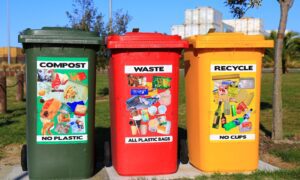What exactly is a waste management degree
One of the most prominent environmental degrees is waste management. Waste management has become an important field that needs experts who know about business and social issues.
Students who take courses in waste management learn about the rules and best practices for dealing with, disposing of, and recycling trash. A degree in waste management usually takes four years to finish, and you need to have taken courses in environmental engineering or science.
How to Get into Degree Programs in Waste Management
If a student wants to participate in one of these programs, they must fulfill the university’s normal requirements for admission. This generally means that applicants must send in a request form, their transcripts, and the results of any tests they took. A personal statement and letters of recommendation may also be required or allowed by some schools.
Most of the time, there are no required courses for these degrees. But some programs require students to finish their introductory courses before choosing a major. Less often, programs require candidates to have taken many classes and had a lot of work experience, or at least have a degree in a similar field.
Coursework for degrees in waste management
Coursework would most likely differ amongst universities because various degrees may educate a pupil for a profession in waste management. Several courses and major fields, though, are shared by all degrees.
Environmental Management:
Environmental management programs often have classes on waste management, natural resource management, and sustainable management, among other things.
Some advanced courses also may focus on how to control certain parts of the world. In these classes, students may look into different environmental problems that have been solved in the past to learn what kinds of solutions were used and how people could be used to solve current problems. The course may show how cutting-edge technologies can be used to solve a wide range of waste management problems.
Government environmental regulations
Students will learn about the various legal frameworks the government uses to deal with environmental issues, such as how to handle trash. They will learn how to accurately look at and judge government laws and rules to figure out how can use them in the real world.
Pollution & Human’s Impact on the environment:
Also, at least each course in these programs is usually about people’s actions, especially making waste, which affects the environment. In addition to how people have hurt the ecosphere, the course will also look at how it works together to reduce these negative effects and promote sustainable ways to deal with waste and pollution.
Research Methods
Students in this program will learn about various ways to plan and build their environmental studies. They will also do their research. Both qualitative and quantitative research methods are taught to students. This course could help students prepare for their thesis or to give them a chance to work on research directed by the faculty. Most likely, students can change the program to fit their research on waste management.
How to Choose a Degree Course in Waste Management
There are many things to think about when choosing the best waste management program for you. Since the content of these programs is a little different, you must probably choose the one that fits your interests and career goals the best.
Make sure that there is a focus or an important waste management curriculum before you sign up. Also, a few of these programs lead to Bachelor of Science degrees, while others lead to Bachelor’s degrees.
The science-focused degree often needs more science courses and can lead to a wider range of job opportunities.
Since the focus of field research is on ecosystems and environments in the area, you should think about where the school is. If you don’t have much time, check to see if you can do part or all of the course online. Think about whether or not your college needs or offers internships or externships. These will assist you in getting a job after you graduate.
Best degrees
BA in Environmental Studies:
The majors can focus on either planning for the environment or interpreting and teaching about the environment. Students should know about the structure, function, and effects of changes in ecosystems, as well as the factors that affect natural systems, such as population increase, pollution, resource use, and
depletion, and the connections between values and attitudes about the environment. These are subjects that have to do with natural science.
Bachelor of Technology in Environmental & Natural Resources Management
You can start the program with a relevant degree from another college, or you can transfer in and choose the environmental resource conservation track, the aquaculture track, or the aquatic science track and finish the associate’s degree along the way.
BS in Business And Environmental Studies
In this innovative curriculum, we merge a traditional business core with more than 40 hours of environmental studies electives to ensure that students know the triple bottom line of people, planet, and profits. Students can get a bachelor’s in business and social studies if they want to learn about business and the environment in a balanced way. Graduate students want to work in business areas that appreciate social, environmental, and cultural diversity and protect the environment.
Bachelor of Science in Environmental Science
Both the general public and businesses are becoming more interested in environmental science. With a BS in Environmental Science from college, you will be ready for opportunities in a world that are changing quickly.
With this college-based multidisciplinary program, you can learn the skills you need to deal with the tough environmental issues of today. In developing countries, environmental disasters hurt the poor the most. As someone with a BS in environmental science, you will be in charge of fixing these problems.



































